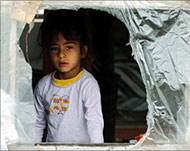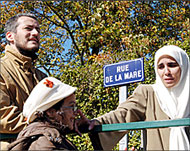French riots borne of mutual exclusion
Newly appointed Interior Minister Nicolas Sarkozy has travelled to southern France to witness the damage caused by riots in the wake of the murders of two North African men.

“Listen to the young people!” cried a resident, as Sarkozy battled his way through the crowds pressing towards him in the centre of Perpignan, 850km south of Paris.
On Friday, his first day in the job, Sarkozy is in this southern city to ease tensions among local communities of North African and gitan (gypsy) origin.
The death of a 28-year-old French-Algerian on 22 May, allegedly at the hands of a group of young gitans after a dispute over a car-radio theft, was followed a week later by the fatal shooting of a 43-year-old man of Moroccan origin.
The previous day members of both communities had united in a 5000-strong march calling for justice and an end to violence. But the second murder served as a catalyst for the rioting which kicked off in the Saint Mathieu district of the city a few hours later. More than 100 shops were damaged and about 50 cars set alight. Shots were also reportedly fired at the police.
Since then, Perpignan has been living in a state of shock – “a nightmare”, as Mayor Jean-Paul Alduy put it.
Fears
Almost everyone says they are afraid of what might happen next.
 |
|
Gypsies have lived in Perpignan |
On the hot summer evening before Sarkozy arrived, the usually busy streets were almost deserted. Police vans ringed the city centre, and the restaurants and café terraces served only a handful of clients.
Since the killings, it appears many families from the inner-city gitan community, which has lived in Perpignan since the 15th century, have fled to lodge with relatives in nearby cities such as Montpellier, hoping to avoid reprisals.
The 600 police drafted in to patrol the streets, and likely to remain for several weeks, lend the place a siege-like air.
Sarkozy, a popular centre-right politician who is said to be eyeing the presidency, has promised the city an additional 30 permanent police officers.
Tough talk
Meanwhile, the murder investigations continue, and some rioters have already received prison sentences ranging from one month to a year. The police have launched a major operation to confiscate illegal weapons.
|
“I will accept nothing; [violence] will lead directly to the prison cell … If it starts again, the reaction will be very tough …” Nicolas Sarkozy |
Against this background, Sarkozy travelled to Perpignan to deliver a clear message to the population: that the state will not tolerate any more violence.
Speaking to journalists, he said: “I will accept nothing; [violence] will lead directly to the prison cell … If it starts again, the reaction will be very tough; whoever is responsible, the severity [of our response] will be just and comprehensive … all hooligans will be punished.”
While this zero-tolerance approach may have been received approvingly by the local shopkeepers he visited, it was not what many inhabitants of the North African and gitan communities had hoped for.
The minister did meet briefly with small delegations from the two groups, but as his shiny cavalcade swept out of town, Francis Blandin from the St Mathieu district was bitter: “I’m disappointed. We wanted him to come to our areas, look at the damage for himself and talk with the young people in the street,” he said.
But Sarkozy had no intention of doing so, stressing he would only enter into dialogue with local youth once peace had been restored to the city.
Community spirit
In contrast, the previous day, the mayor had attempted to instigate just such a conversation with young people in the Saint Martin district, whose local social centre was partially destroyed by fire this week, the night after a visit from the Moroccan ambassador.
 |
|
Sarkozy was criticised for not |
Awaiting the mayor’s arrival, a group of local women lamented the damage to a place that “brought members of this community – North Africans, gitans, French, Spanish and Portuguese – together for marriages, parties, meetings”.
“All we want is peace,” said one with tears in her eyes. Mayoral Deputy for Social Affairs Brigitte Puiggali condemned the fire as “an attack on this city’s social policies that penalises residents who are in a difficult situation”.
Not surprisingly, the debate between the mayor and local citizens of both North-African and gitan origin was heated. Yet there was little talk of enmity between the communities in the wake of the murders.
Social outcasts
Instead, the focus was on the insecurity, discrimination and marginalisation experienced by members of both groups living in Perpignan’s inner-city districts, where unemployment and poverty are rife.
A 35-year-old student argued that the riots were a symbol of young people’s anger: “[Our community] has suffered these problems for years: rebellion, resentment, sorrow. If we go to a café, try to get into a club or look for work, we are refused because of who we are.”
The mayor acknowledged that “France is enormously behind when it comes to issues of integration and discrimination”, adding that while the battle could be won, recent events in the city had set efforts back by as much as three to four years.
Media misrepresentation
The national Movement Against Racism and For Friendship Between Peoples (MRAP) has expressed its frustration at the widespread media portrayal of events in Perpignan as a war between immigrant communities.
 |
|
Hundreds of thousands of French |
“It is a question of unrelated incidents and delinquency that got out of hand, but the way the facts have been presented is unacceptable and discriminatory – people forgot to mention that gitans are French and so are young Arabs,” explains Secretary-General Mouloud Aounit.
For him, the responsibility clearly lies with politicians: “When you organise people into ghettos, the ingredients for an explosion are in place. What happened in Perpignan is a result of ghettoisation and political patronage. It was foreseeable, and there are similar situations in other towns and cities in France that could also explode.”
Citizenship
For Ahmed Ben Naoum, professor of sociology and anthropology at Perpignan University, the stigmatisation of the North African and gitan communities as minorities is deplorable.
“There are no minorities in Perpignan, but there are French people who have been marginalised, who have felt de-centred for a long time, and who live in a completely catastrophic situation because of their origins.
“They are formal citizens, but not full citizens.”
It is only by tackling this that social tension can be eased in the long-term, he argues.
“First and foremost, people must be given the economic, social and cultural means to attain normal citizenship – not just an identity card and a ballot paper.”